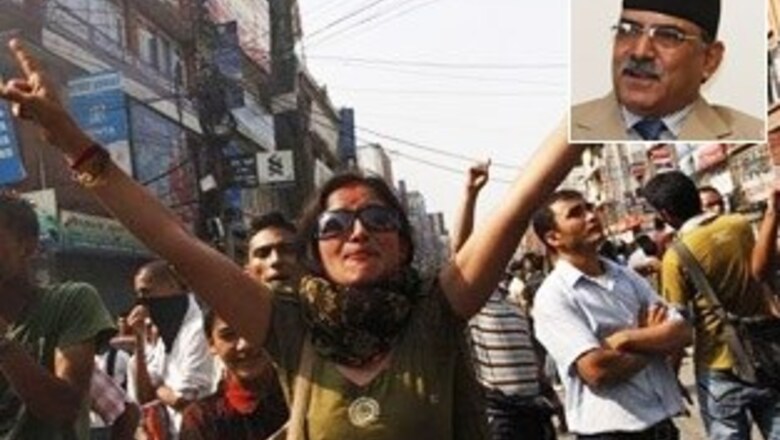
views
Kathmandu: Nepal Prime Minister Pushpa Kamal Dahal Prachanda on Monday announced his resignation following a raging row over the sacking of army chief General Rukmanga Katawal.
Prachanda, Nepal's first Maoist prime minister, announced his resignation in a televised address to the nation, blaming Nepal's political parties and foreign powers for hindering his government.
The former revolutionary's resignation came after two major allies of his coalition government pulled out on Sunday following a long quarrel over the sacking of the army chief, leaving the Prachanda government under the cloud of a no-trust vote in parliament and likely defeat.
In his brief message, the 55-year-old, who rose from the grassroots to lead a 10-year armed uprising against the government, blamed the political parties, which included the Opposition as well as his own allies, as well as "foreign powers" for the lack of progress made by his eight-month government.
Without naming India, he also accused the southern neighbour of interfering in Nepal's internal matters and said the country would never bow down before foreign masters.
The prime minister also charged President Ram Baran Yadav of going against the constitution by reinstating army chief Gen Rookmangud Katawal who, he said, had been dismissed by an elected government to ensure the sovereignty of the people.
The presidential move was a death blow to Nepal's "fledgling republic", he said.
At the end of the address, during which Prachanda fumbled and looked ill at ease, he announced his resignation, evoking images of a similar televised address by deposed king Gyanendra three years ago when the monarch stepped down as head of government after widespread protests.
The resignation was welcomed by the opposition Nepali Congress party that Monday had begun calling for Prachanda's resignation.
Earlier on Monday, President Ram Baran Yadav overturned Prachanda’s decision asking Gen Rukmangad Katawal to remain as Nepal's army chief.
Katawal had been given the marching orders by Prachanda on Sunday. But Yadav asked Katawal to stay put as he said PM's orders did not meet the "constitutional requirements and due process".
"Since the dismissal of the Army Chief and the new appointment do not meet the constitutional requirements and due process, I hereby direct you to continue as the Chief of the Nepali Army," the President said in a letter to Gen Katawal late on Sunday night.
Nepali journalist Kanakmani Dikshit of Himal South Asian analysed the situation, saying Nepal had been saved from a "worst case scenario". "PM has taken a moral high road. That would a best option to have an all party coalition instead of incongruent , unstable and uneasy alliance form of government before," he said.
Prachanda has made a great stride to consolidate his own political position by hardliners in party. He has done himself a great amount of good. It was anyway a bad time for Maosits in government. They tried doing this to judiciary, press, bureaucracy. There is no FDI coming in. He has nothing to be proud of. Maoists had to understand the complexities of government. The PM having resigned, has shown the Maoists have been forced to mature," he said
FEAR OF VIOLENCE SPREADS
Fears of violence spread through the nation as public rallies erupted in the capital, Banepa and Birgunj cities.
While Maoist cadres condemned the president, eight sister organisations of the NC, joined by the UML's youth wings, criticised the "despotic" nature of the Maoist government.
To pre-empt clashes, Kathmandu authorities prohibited rallies and demonstrations in front of the army headquarters and Shital Niwas, the residence and office of the president.
The fall of the Maoist government raises fresh fears about the fate of the fragile peace process, especially the proposed merger of their guerrilla fighters with the Nepal Army and the drafting of a new constitution by next year.
It also creates a bad precedent of the army and constitutional head of state locking horns with an elected government.
While there was no immediate reaction from the international community, the UN, watching the developments with rising concern, called for restraint and consensus.
"The secretary general is seriously concerned about the current political crisis in Nepal centred on the relationship between the government and the chief of army staff and the possible risks posed to the peace process," a statement issued by the UN chief's office in New York said.
PAGE_BREAK
"The secretary general calls on all concerned to resolve the crisis through dialogue and consensus, with full respect for the provisions of the constitution."
HOW THE CRISIS STARTED
Yadav's move came hours after Prachanda sacked the Army Chief who refused to step down plunging the country into a political crisis.
The President had on Sunday asked Prachanda, a former Maoist rebel leader, to follow constitutional provisions and seek a political consensus over firing Gen Katawal.
The letter asking Gen Katawal to remain in office also came after 18 political parties urged the President to protect the "constitution and block action against the Army Chief."
The crisis is the worst to hit Nepal as a new Constitution is yet to be framed and the old constitution is silent on the appointment of Army Chief which was the prerogative of the King.
The crisis follows months of tussle between the Prime Minister and the Army Chief over the induction of former Maoist rebels into the Army.
The Maoists have also decided to hold talks with Madhesi People's Rights Forum and other smaller parties to retain majority in the 601 member Constituent Assembly.
Hours after Prachanda sacked Gen Katawal yesterday accusing him of defying the government's orders by reinstating eight Generals retired by the Maoist administration, the President told the Army Chief to remain in the post.
"Being the head of the state and the supreme commander of the Nepal Army I order you to continue with your duty," Yadav said in a letter sent to Gen Katawal late last night. Copies of the letter were sent to the Prime Minister's Office and six regional headquarters of the Army.
"The dismissal of the Army Chief and the new appointment do not meet the constitutional requirements and due process," the President said.
Five facts about Prachanda
- Prachanda, 54, is the chief of the former Maoist rebels who waged a decade-long civil war in the jungles of the rugged Himalayan foothills until 2006. Prachanda is his nom-de-guerre, which means "fierce". His real name is Pushpa Kamal Dahal.
- The bespectacled ex-rebel was named Pushpa Kamal, or Lotus Flower, by a teacher, because of his mild manners. During the insurgency in which 13,000 people died, he was rarely seen in combat dress and never took part in fighting.
- He became the republic's first elected prime minister after the rebels laid down arms and surprisingly won the largest number of seats in a 2008 election. While the Maoists entered Nepal's political mainstream, the United States still lists them as a terrorist group.
- Prachanda's revolutionary zeal was reportedly sparked when he first saw a picture of China's communist leader Mao Zedong as a schoolboy. He has dropped much of his Marxist and Maoist rhetoric, and said he wants Nepal to become the "Switzerland of Asia" and draw millions of tourists. He says Nepali Maoists are not "dogmatic communists".
- The former agricultural science teacher is said to be skilled at organisation and breeds loyalty and discipline among his followers. However, critics say he is self-centred and willing to dump even his closest colleagues.










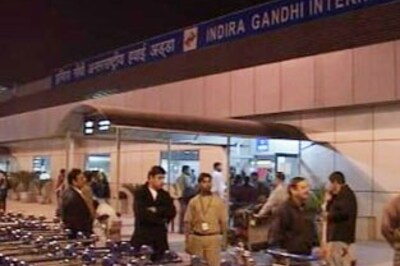

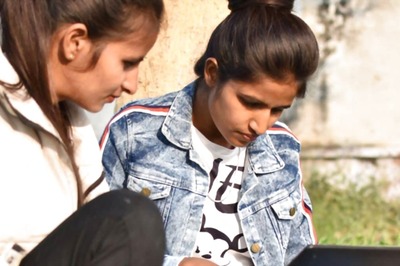


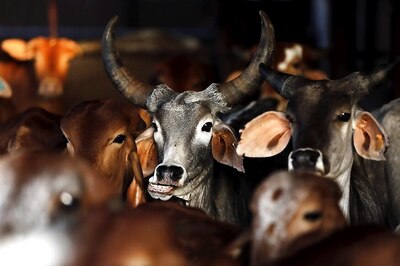
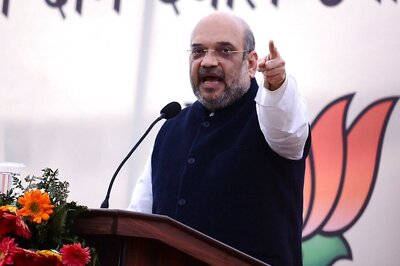
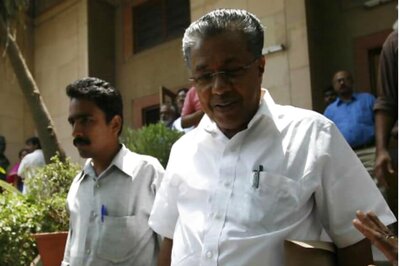
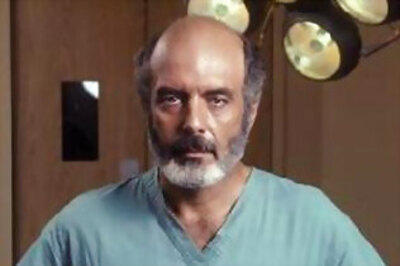
Comments
0 comment